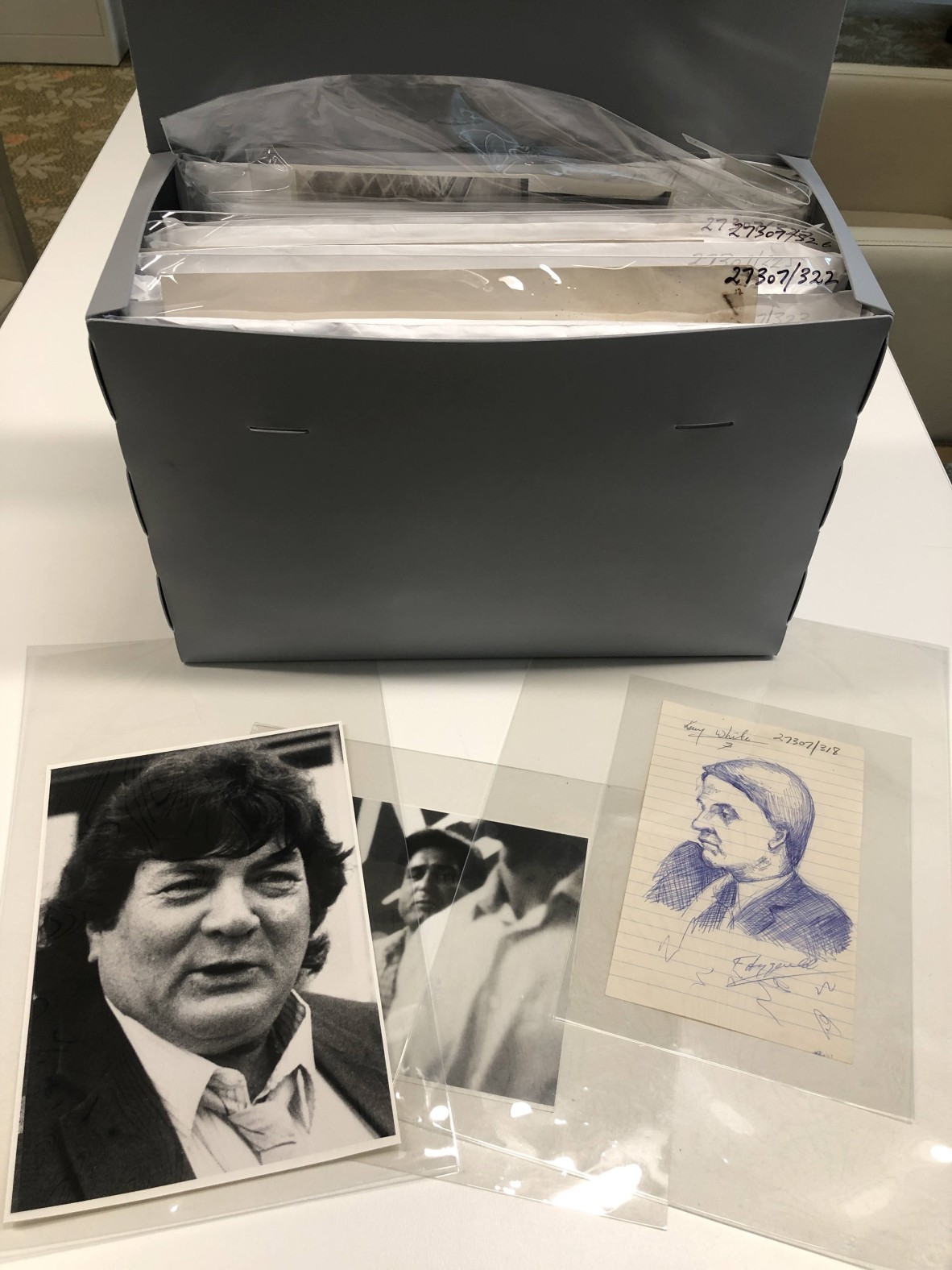Discovering the wonder of the mundane in the sexy side of organised crime
By A/Professor Mark Lauchs, 2021 John Oxley Library Honorary Fellow | 5 August 2022
This blog was written by 2021 John Oxley Library Honorary Fellow A/Professor Mark Lauchs as part of his research project, Social Networks of Crime and Corruption: the First and Second Jokes.
I am so very proud to have won an Honorary Fellowship to study the Phil Dickie Collection in the John Oxley Library. Mr Dickie is a local hero who bravely reported on the corruption and organised crime in Queensland and was a catalyst for the Fitzgerald Inquiry. He donated his notes and materials to the Library where it is held in a restricted reserve.
I entered the Fellowship not knowing what I would find in the collection. My first expectation was that the content would have additional information about the events leading up to the Fitzgerald Inquiry and the work Mr Dickie conducted prior to that inquiry in his publications in the newspapers. To some extent this was true. They were notes, annotated files, and some photographs. But most of this material had been reflected in his publications. In other words, it was not new information.

Left: A/Professor Mark Lauchs, 2021 Honorary John Oxley Library Fellow.
Right: Investigative journalist Phil Dickie.
The Road to Fitzgerald. Phil Dickie, University of Queensland Press, Brisbane, 1988. John Oxley Library, State Library of Queensland.
However, this material formed only half of the content of the many boxes in the collection. I found that Mr Dickie, having already uncovered corruption and organised crime in Queensland, was looking to the past and the future to learn more about the threats to Queenslanders from the broader organised crime community. There were files on the Calabrian mafia, the Japanese Yakusa, car theft rings, outlaw motorcycle gangs, corruption in the racing industry, corruption in the car towing industry and the broader national threats of organised crime. Mr Dickie was also researching as much as he could into other organised crime inquiries in Australia including the royal commissions in other states into the drug industry, the Painters and Dockers Union and the Nugan-Hand bank.
27307/189 Miscellaneous copies of material including newspaper clippings, notes, reports, journal articles, police reports relating to the activities of the Japanese Yakusa crime syndicate. 27307 Phil Dickie Collection 1964-1989, John Oxley Library, State Library of Queensland.

27307/316 Photographs from the Phil Dickie collection. 27307 Phil Dickie Collection 1964-1989, John Oxley Library, State Library of Queensland.
Initially I did not know what to do with all this material, so I just began reading. What struck me very quickly was a key characteristic of organised crime not just in in our state but anywhere in the world. Organised criminals service a marketplace. Most organised crime is associated with the different forms of vice, namely sex, drugs, and gambling. To some extent every government controls these three vices. There is no completely free marketplace for any of them that is not regulated by government or made illegal in the community. Nonetheless, people in the community are the customers for the goods and services provided in the illicit economy. Providing these goods and services to people who cannot obtain them legally is very lucrative. People are willing to pay extra for what they cannot obtain on the open market. The extraordinary profits are what attract people to organised crime.
We have a pop-culture picture of organised crime based that shows high profile people as Mr Bigs of the drug industry or senior politicians taking bribes. These stories are exciting and sexy, but they are less than 1% of the picture. Day-to-day organised crime is conducted in our local suburbs between people we know. Everyday Australians are the customers and providers of illicit goods and services. This is the missing part of the story of organised crime. Even when these people appear the story is spun to make the participants look like outsiders; foreign drug dealers and depraved or destitute customers. This is very, very far from reality. The oldest generation in Queensland were the Flower Power, freedom and love generation. While the scene may look relatively tame, they at least knew people or were themselves buying drugs. They and their parents will have known customers and workers in the local “brothels” and gambling venues. As a teenager in the 1980s I knew where the sex-workers worked because they were in shops on main roads with big signs advertising their existence. One on Gympie Road was forthright enough to have a red light out the front. Even I have drunk after official closing times in pubs in Brisbane – an offence sufficient to warrant an inquiry in the 1960s. In other words, the story of organised crime in Queensland is a story of us as Queenslanders.
Phil Dickie and others have told the story of the big players in corruption in Queensland. There are many books on the topic, and while I am sure there are untold parts of those very important stories, it is equally important to start revealing the lives of the many other people in this picture. What was it like for the men and women who provided the sex work? What is the story of the average guy who bet through his local SP Bookie at the pub? What were the harms and consequences of these business? What were the attitudes of everyday people?
Part of this story is in the newspapers and court documents which are rich sources of the lives of individual Queenslanders. There are also biographies to touch on this part of society. But the State Library has more resources that can enliven the stories such as local histories, photographs, and the collection of paraphernalia of everyday life that can connect us to people in the past. I will be heading down this path. Along the way I will also tell new stories of crime and corruption that did not receive the notoriety of Fitzgerald, or have been forgotten. The history is important and we need to find it and tell it to understand the nature of crime, make reasonable responses and plan for the future.
A/Professor Mark Lauchs, 2021 John Oxley Library Honorary Fellow.
Collections
- 27307 Phil Dickie Collection 1964-1989. John Oxley Library, State Library of Queensland. Please note this collection has restricted access. 24 hours notice is required to view the collection, please contact qldmemory@slq.qld.gov.au for more information.
Other blogs
Comments
Your email address will not be published.
We welcome relevant, respectful comments.